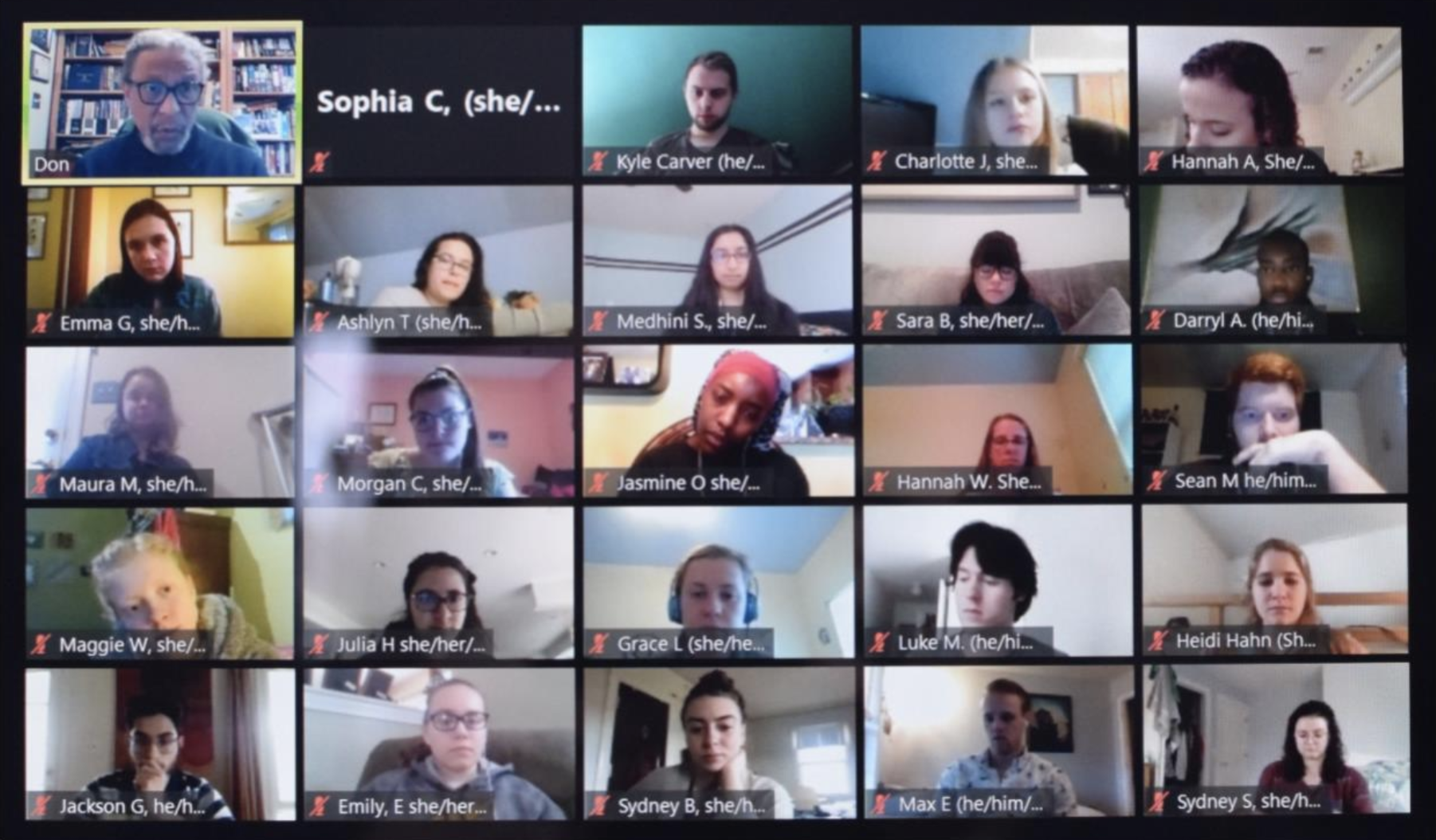[It] reminded everyone that environmental justice activism is still important even when we are social distancing.
— Charlotte Joannidis, Honors College sophomore
Despite the challenges posed to organizing a conference while maintaining social distancing, on Saturday, March 28th, Mason Environmental Justice Alliance (MEJA) hosted an all-day virtual Zoom event featuring speakers and group workshops. Although initially planned to be held at the Smithsonian-Mason School of Conservation, the Virginia Environmental Justice Summit (VEJS) had since been made online due to the novel coronavirus pandemic.
But the disruption had its advantages: with the event online, more than 75 attendees were able to join the conversation and listen to more than ten different speakers.
The event brought together activists, organizations, and students from an array of disciplines and communities across Virginia in an effort to exchange ideas, build skills, and network. Included on the agenda was a keynote speaker; break-out sessions on the topics of pipelines, food justice, and water quality issues; a grassroots activists’ panel on gas power plants, the Atlantic Coast Pipeline, and a mega landfill; and skill building workshops on advocacy and lobbying.
The summit came at a time when many members of our Mason community had recently been sent home to quarantine and social distance. The conference presented a unique and welcomed opportunity for engagement with peers and inspiring issues.
“[It] reminded everyone that environmental justice activism is still important even when we are social distancing,” says Honors College sophomore Charlotte Joannidis.
The planning committee behind the summit was centered in MEJA, with many Honors College students — including Hanna Adamson, Sara Babcock, Emma Gregory, Amy Hannum, Charlotte Joannidis, Katie Russell, and Medhini Sosale — playing an important part of its success. Over the course of social distancing, the organizers met online, finding time between classes to pull everything together in a virtual format.
“It was hard to keep pushing for participants and remain positive after the entire vision of the event was stripped from us,” tells senior Sara Babcock.
Main organizer and senior Emma Gregory, who is a Community Engagement Nominee for SAIL’s 2020 Seeds of Change Award, talks about her inspiration for the summit: “I’m really passionate in engaging people in the realm of the environment, while also focusing on justice and equity issues within the conservation movement.”

VEJS attendees listen to keynote speaker Don Edwards speak on the topic of movement building. Photo courtesy of Sophia Chapin.
One of the most impactful quotes of the day came from keynote speaker Don Edwards, who was a member of the U.S. delegation to the "Earth Summit" in 1992 and is the current CEO and co-founder of Principal of Justice and Sustainability Associates (JSA). While talking about movement building, he posed two questions to the students: “What is going to be required of you personally to create more environmental justice? […] Which privileges are you prepared to give up?” This prompted attendees to consider their commitment to change, and what it means to be an activist. “When you say that you’re working for justice, you put yourself on the spot,” maintained Edwards.
The last session of the day asked attendees to put environmental justice in the context of their daily lives by discussing COVID-19 and taking pledges to act on issues in their communities both during social distancing and far into the future.
“The pandemic itself brought social injustices to the forefront of everyone’s mind, with inequalities in testing and a lack of a universal healthcare, so it was important for us to use the summit as a platform to address those inequalities and the disproportionate affect that the pandemic has on people with years of systemic injustice, putting poor and minority communities as the most vulnerable,” explains Babcock.
Students in breakout sessions were also prompted to write messages of inspiration, which were shared on sticky notes and phone screens in the final session. “Environmental justice is not just a box to be checked,” wrote one attendee. Another message exclaimed, “you have the power to make change!” Others focused on reassuring peers in this complicated time: “Be kind and know we all have the power to help another.”
“Now that the summit is over, I feel honored to have been a part of the process. I am proud of the way we were able to bring about 75 people together to talk about important environmental justice issues in Virginia and build skills to tackle them,” shares Honors College freshman Hannah Adamson.
The Virginia Environmental Summit is planned to be held again next year, hopefully in person, says organizers. “We learned a lot from hosting this event for the first time. Next year we hope to work more closely with our speakers and offer even more opportunities for engagement between participants,” notes Adamson.
Missed the event but still want to act on environmental justice issues? Get involved with the community by joining the Virginia Environmental Justice Network Slack workspace or volunteer to serve on next year’s Planning Committee by emailing organizer Emma Gregory at egregor3@gmu.edu. Other ideas to make a difference include contacting your representative about an environmental issue, joining virtual climate strikes, or staying informed by taking online classes or seminars.
